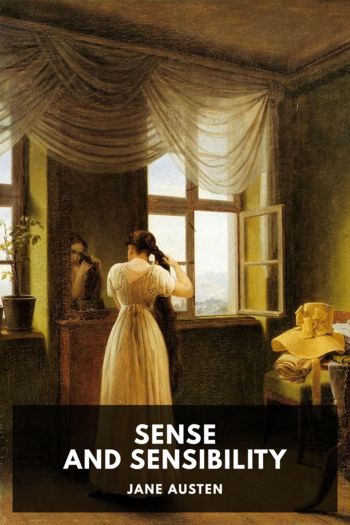Sense and Sensibility - Jane Austen (classic literature list txt) 📗

- Author: Jane Austen
Book online «Sense and Sensibility - Jane Austen (classic literature list txt) 📗». Author Jane Austen
Elinor made no answer. Her thoughts were silently fixed on the irreparable injury which too early an independence and its consequent habits of idleness, dissipation, and luxury, had made in the mind, the character, the happiness, of a man who, to every advantage of person and talents, united a disposition naturally open and honest, and a feeling, affectionate temper. The world had made him extravagant and vain—extravagance and vanity had made him cold-hearted and selfish. Vanity, while seeking its own guilty triumph at the expense of another, had involved him in a real attachment, which extravagance, or at least its offspring, necessity, had required to be sacrificed. Each faulty propensity in leading him to evil, had led him likewise to punishment. The attachment, from which against honour, against feeling, against every better interest he had outwardly torn himself, now, when no longer allowable, governed every thought; and the connection, for the sake of which he had, with little scruple, left her sister to misery, was likely to prove a source of unhappiness to himself of a far more incurable nature. From a reverie of this kind she was recalled at the end of some minutes by Willoughby, who, rousing himself from a reverie at least equally painful, started up in preparation for going, and said—
“There is no use in staying here; I must be off.”
“Are you going back to town?”
“No—to Combe Magna. I have business there; from thence to town in a day or two. Goodbye.”
He held out his hand. She could not refuse to give him hers: he pressed it with affection.
“And you do think something better of me than you did?” said he, letting it fall, and leaning against the mantelpiece as if forgetting he was to go.
Elinor assured him that she did;—that she forgave, pitied, wished him well—was even interested in his happiness—and added some gentle counsel as to the behaviour most likely to promote it. His answer was not very encouraging.
“As to that,” said he, “I must rub through the world as well as I can. Domestic happiness is out of the question. If, however, I am allowed to think that you and yours feel an interest in my fate and actions, it may be the means—it may put me on my guard—at least, it may be something to live for. Marianne to be sure is lost to me forever. Were I even by any blessed chance at liberty again—”
Elinor stopped him with a reproof.
“Well,” he replied, “once more goodbye. I shall now go away and live in dread of one event.”
“What do you mean?”
“Your sister’s marriage.”
“You are very wrong. She can never be more lost to you than she is now.”
“But she will be gained by someone else. And if that someone should be the very he whom, of all others, I could least bear—but I will not stay to rob myself of all your compassionate goodwill, by showing that where I have most injured I can least forgive. Goodbye—God bless you!”
And with these words he almost ran out of the room.
XLVElinor, for some time after he left her, for some time even after the sound of his carriage had died away, remained too much oppressed by a crowd of ideas, widely differing in themselves, but of which sadness was the general result, to think even of her sister.
Willoughby—he, whom only half an hour ago she had abhorred as the most worthless of men—Willoughby, in spite of all his faults, excited a degree of commiseration for the sufferings produced by them, which made her think of him as now separated forever from her family, with a tenderness, a regret, rather in proportion, as she soon acknowledged within herself, to his wishes than to his merits. She felt that his influence over her mind was heightened by circumstances which ought not in reason to have weight; by that person of uncommon attraction, that open, affectionate, and lively manner which it was no merit to possess; and by that still ardent love for Marianne, which it was not even innocent to indulge. But she felt that it was so, long, long before she could feel his influence less.
When at last she returned to the unconscious Marianne, she found her just awaking, refreshed by so long and sweet a sleep to the extent of her hopes. Elinor’s heart was full. The past, the present, the future, Willoughby’s visit, Marianne’s safety, and her mother’s expected arrival, threw her altogether into an agitation of spirits which kept off every indication of fatigue, and made her only fearful of betraying herself to her sister. Short was the time, however, in which that fear could affect her, for within half an hour after Willoughby’s leaving the house, she was again called downstairs by the sound of another carriage. Eager





Comments (0)